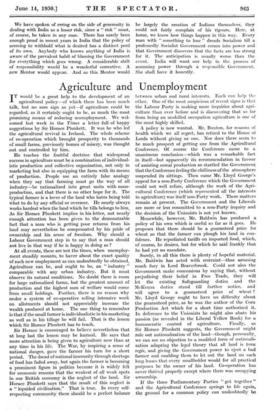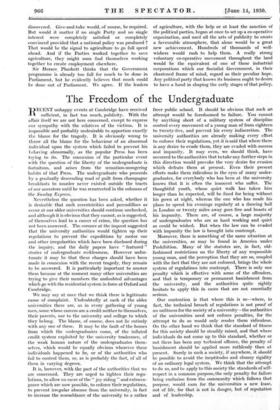Agriculture and Unemployment I T would be a great help to
the development of an agricultural policy—of which there has been much talk, but no sure sign as yet—if agriculture could be regarded, as it certainly ought to be, as much the most promising means of reducing unemployment. We wel- comed last week in the Times a letter full of happy suggestions by Sir Horace Plunkett. It was he who led the agricultural revival in Ireland. The whole scheme of co-operation which brought prosperity to thousands of small farms, previously homes of misery, was thought out and controlled by him.
He teaches the fruitful doctrine that widespread success in agriculture must be a combination of individual- istic production and collective organization, not only in marketing but also in equipping the farm with its means of production. People use an entirely false analogy when they say that farming must go the way of all industry—be rationalized into great units with mass- production, and that there is no other hope for it. The typical farmer is a lover of the land who hates being told what to do by any official or overseer. He nearly always works hardest when the land which he tills belongs to him, As Sir Horace Plunkett implies in his letter, not nearly enough attention has been given to the demonstrable fact that a. man who is getting poor returns from his land may nevertheless be compensated by his pride of ownership and his sense of freedom. Why should a Labour Government step in to say that a man should not live in that way if he is happy in doing so ?
At all events, these are hot the times, when unemploy- ment steadily mounts, to haver about the exact quality of such new employment as can undoubtedly be obtained, Agriculture can be, and ought to be, an " industry " comparable with any urban industry. But it must observe its natural conditions. No doubt there is room for large rationalized farms, but the greatest amount of production and the highest sum of welfare would come from small holdings. Further, there is no reason why .under a system of co-operative selling intensive work on allotments should not appreciably increase the wealth produced at home. The one thing to remember is that if the small farmer is individualistic in his marketing as well as in his tillage he will fail. That is the lesson which Sir Horace Plunkett has to teach.
Sir Horace is encouraged to believe nevertheless that at long last the lesson may be learned. He says that more attention is being given to agriculture now than at any time in his life. The War, by inspiring a sense of national danger, gave the farmer his turn for a short period. The dread of national insecurity through shortage of food has faded away, but again the farmer is becoming a prominent figure in politics because it is widely felt for economic reasons that the weakest of all weak spots in our British economy is the neglect of the land. Sir Horace Plunkett says that the result of this neglect is a " lopsided civilization." That is true. In every self- respecting community there should be a perfect balance between urban and rural interests. Each can help the other. One of the most auspicious of recent signs is that the Labour Party is making more inquiries about agri- culture than ever before and is discovering that so far from being an unskilled occupation agriculture is one of the most highly skilled.
A policy is now wanted. Mr. Buxton, for reasons of health which we all regret, has retired to the House of Lords without giving us one. Nor does there seem to be much prospect of getting one from the Agricultural Conference. Of course the Conference came to a unanimous conclusion—which was a remarkable fact in itself—but apparently its recommendation in favour of assisting cereal production so startled the Government that the Conference feeling the chilliness of the atmosphere suspended its sittings. Then came Mr. Lloyd George's appeal for a non-Party Conference which the Government could not well refuse, although the work of the Agri- cultural Conference (which represented all the interests in agriculture) was itself non-Party work. There matters remain at present. The Government and the Liberals are more or less committed to a non-Party inquiry and the decision of the Unionists is not yet known.
Meanwhile, however, Mr. Baldwin has produced a policy of his own which is useful so far as it goes. He proposes that there should be a guaranteed price for wheat so that the farmer can plough his land in con- fidence. He repudiated tariffs on imported food, which, of course, he desires, but for which he said frankly that he had yet no mandate.
Surely, in all this there is plenty of hopeful material. Mr. Baldwin has acted with restraint—thus arousing much fury in Lord Beaverbrook. Could not also the Government make concessions by saying that, without prejudicing their belief in Free Trade, they will let the existing Safeguarding duties and the McKenna duties stand till further notice, and will agree to a guaranteed price of wheat ? Mr. Lloyd George ought to have no difficulty about the guaranteed price, as he was the author of the Corn Production Act which for a short time authorized it. In deference to the Unionists he might also abate his passion (as revealed in the Liberal Yellow Book) for a bureaucratic control of agriculture. Finally, as Sir Horace Plunkett suggests, the Government might rule out nationalization of the land—though, personally, we can see no objection to a modified form of nationali- zation adapting the legal theory that all land is terra regis, and giving the Government power to eject a bad farmer and enabling them to let out the land on such long leases that every smallholder would for all practical purposes be the owner of his land. Co-operation has never thrived properly except where there was occupying ownership.
If the three Parliamentary Parties " get together " and the Agricultural Conference springs to life again, the ground for a common policy can undoubtedly be discovered. Give-and-take would, of course, be required. But would it matter if no single Party and no single interest were completely satisfied or completely convinced provided that a national policy was produced ? That would be the signal to agriculture to go full speed ahead. And if the Parties worked together to save agriculture, they might soon find themselves working together to create employment elsewhere.
Sir Horace Plunkett thinks that the Government programme is already too full for much to be done in Parliament, but he evidently believes that much could be done out of Parliament. We agree. If the leaders of agriculture, with the help or at least the sanction of the political parties, began at once to set up a co-operative organization, and used all the arts of publicity to create a favourable atmosphere, that alone would be a great new achievement. Hundreds of thousands of well- wishers would rush to help them. A really strong voluntary co-operative movement throughout the land would be the equivalent of one of those industrial corporations which our Socialist Government, in their chastened frame of mind, regard as their peculiar hope. Any political party that knows its business ought to desire to have a hand in shaping the early stages of that policy.



































 Previous page
Previous page